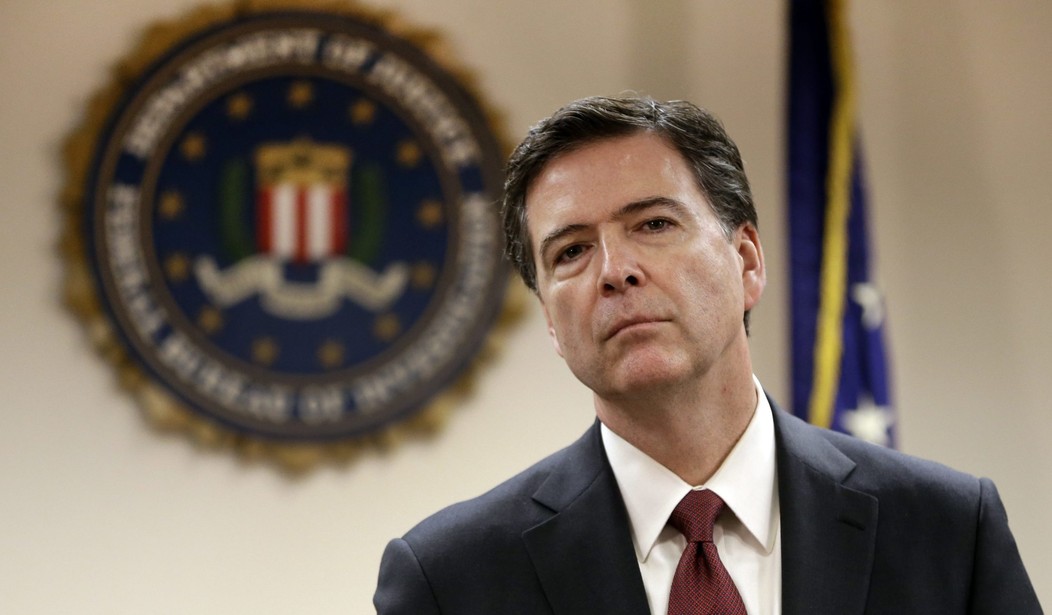FBI Director James Comey said Sunday that despite protests against police brutality and “however good their intentions, Americans actually have no idea whether the number of black people or brown people or white people being shot by police is up, down, or sideways over the last 10 years.”
Speaking to the International Association of Chiefs of Police Annual Conference in San Diego, Comey said the leaders law enforcement needs “know their neighborhoods with the greatest need for police and they know the people who live there — in particular, they know the history and journey of black America.”
“They know the hopes, the dreams, the disappointments and the pain. They know the history of law enforcement’s interaction with black America, because the black people of America know it and remember it for reasons that make good sense,” he said. “They know that African-Americans, like all Americans, want good policing because they know it is the path to safety and prosperity.”
Leaders must “understand that our challenges are multiplied by a narrative that is forming about American policing,” he added.
“It is a narrative that has formed, in the absence of good information and in the absence of actual data, and it is this: Biased police are killing black men at epidemic rates. That is the narrative. It is a narrative driven by video images of real misconduct, possible misconduct, and perceived misconduct. It is a narrative given force by the power of empathy. It is also a narrative pushed forward by the surprise and shock of civilians at seeing how fast and complicated police activity can be.”
Comey noted that “people of good will are protesting—including here in San Diego—because they believe there is an epidemic of police violence against black people.”
Protests have centered on the Sept. 27 shooting of Alred Olango, who was killed by police who said he withdrew something from his pocket in a threatening manner. He was unarmed; the object turned out to be a vaping device.
The FBI director argued that protesters “have no idea whether black people or brown people are more likely to be shot during encounters than white people are.”
“There is actually some recent research from a Harvard economist who focused on 10 major departments, analyzing over 1,000 shootings showing lethal force is more likely to be used against white people, while non-lethal force is more likely to be used against black people. But we really don’t know well enough on a national basis,” he said. “There were 10.7 million arrests in this country last year, and many times that number of encounters between officers and civilians. Out of those tens of millions of encounters, how many people were shot? What did they look like? What were the circumstances? Is deadly force use trending up or down? Where is it worst and where is it best? Nobody knows.”
“They have no idea of these things because we have no idea of these things. We simply don’t know. As a country, we simply haven’t bothered to collect the data, to gather the information. And in the absence of information, we have anecdotes, we have videos, we have good people believing something terrible is going on. In a nation of almost a million law enforcement officers and tens of millions of police encounters each year, a small group of videos serve as proof of an epidemic.”
Comey said the narrative under which people are protesting “can keep good officers in their cars and good people in their homes, separated by a chasm of fear and distrust.”
Law enforcement leaders, he told the chiefs, should “worry that self-initiated police activity is on the decline in our most violent cities.”
“The leaders we need ask questions: Do my officers get out of their car at midnight to ask a group of kids what their business is on a street corner? Do they stop the car with tinted windows that just ran a stop sign in a high-crime neighborhood? Do they get out to pat down the known offender who has been standing for an hour on a known drug corner? Or, as you have told me, do they first ask themselves, ‘Could this get me famous or dead?’ And the answer changes policing and changes neighborhoods,” he continued.
Comey warned that as law enforcement is “something decried as inherently racist,” talented future recruits could pick another line of work.
“If quality young people stop signing up, we may not notice it for a few years, but the day will come when we will be deeply sorry that we failed to explain to great young people why they should choose law enforcement, that we failed to show them the true heart of law enforcement,” he said.
“There are bad cops. There are departments with troubled cultures. Unfortunately, people are flawed. In any large group, there will be bad ones. All professions want to find and root out the bad ones. There are bad bankers, bad lawyers, and bad software engineers. There are companies and firms with troubled cultures. But for law enforcement, the spotlight is brighter and the standards are higher. That is the way it should be, given the power and authority we are entrusted with. We accept those standards and must work hard to measure ourselves against them. And of course the pressure on cops is unique. There is no doubt that some cops come to see young men of color on their beat as perps because they see so many who have gone wrong. That’s dumb and unjust and we have to constantly resist it, to train it out and root it out.”









Join the conversation as a VIP Member